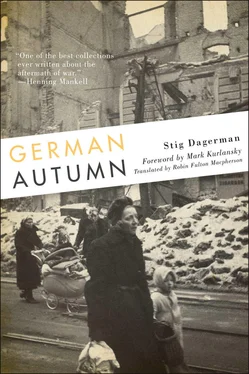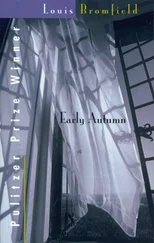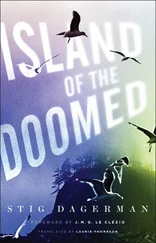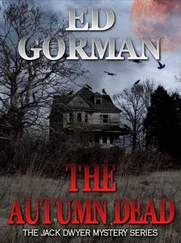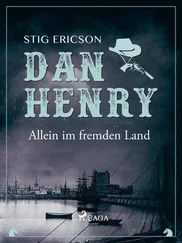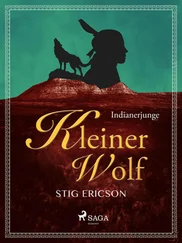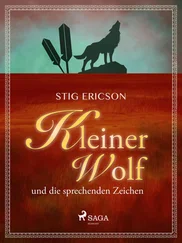Like the forests, the villages have had time to lick their wounds. The wreckage of the dentist’s villa has been cleared up but when the Sunday cinema is over people often saunter past the site and reminisce on the event, or they go up to the abutment of the bridge and stand gazing down at the autumn waters swirling round the pier-stumps. The bridge was blown up by hysterical SS lads at about five minutes past twelve. Their hated memory is still intensely alive in the village. ‘ Oh — sie haben gerv-ü-ü-ü-tef — Oh, they were furious, almost worse than the Poles.
The defeat trailed through the main street of the village for two whole days: ragged and muddy soldiers from the Wehrmacht on bicycles or on foot and last in the queue the young boys and old men of the Great Assault, sniffling and stumbling through the mire of defeat. Of the victors people remember especially the dashing Scotsmen, about a dozen of whom lie buried in a piece of ground sloping towards the river, under white crosses bright as spring flowers in the wet autumn gloom. The village children play war-games in the porches of the cold overpopulated houses along with tattered refugee children from the eastern zone or from Sudetenland. Children in villages get up late in the mornings, trying to cheat the stomach into sleeping past a meal they cannot have. If one shows them a picture-book they will unfailingly begin to consult each other as to how they can best beat to death the human figures or the animals shown on the pages. Small boys who have been twice bombed out of home, who can scarcely yet speak properly, pronounce the word ‘itotschlagen’ with gruesome precision.
In the course of a single year the village by the Weser has had its population increased tenfold and new inhabitants are arriving all the time at these little brick houses which are already inflamed by the hate, envy and hunger of the overcrowded. In a tiny hovel with greaseproof paper instead of glass in the window lives Henry, a Sudeten-German boy who lost part of a leg in the war on the Baltic but who this year lost his heart to the Englishmen he works for. He has been given a watch by his English major and he reads Edgar Wallace in English during the night when it is too cold to sleep. In another little ice-cold room a German-Hungarian girl is allowed to borrow a bed at night. Through the day she helps out at the village doctor’s house or wanders around on the southern bank of the Weser longing for Budapest. She has twice tried to take her life with sleeping-pills. The whole household is now waiting for the third attempt.
Compared to the cities with their bleeding ruins, the German villages do look as if they have recovered, and the forests look in good shape, but this good health is only apparent. I spend a few days in a small village outside Darmstadt with an evacuated family in a tumbledown farm with neither land nor animals. This is reached through oak woodlands that cling to a gentle blue mountainside. A Roman cutting runs down the slope. The region is full of abandoned mills by romantically rustling streams. In a ditch there lies a blasted filing-cabinet from an old Wehrmacht store but there are no other wartime mementoes to be discovered. However, as we sit talking in the kitchen one evening there is a knock on the door and a little ruddy apple-cheeked boy comes in, wanting to play with the child who lives here, a small, thin five-year-old girl who has spent nearly every night for two years sitting in cellars. When asked if she would like a doll for Christmas instead of her old Seppelchen, which has endured as many cellar-nights as she has, she replies that she would rather have a sandwich with a really thick layer of butter. But that is only something to dream of. Now and then when she has been specially good she gets a sandwich with margarine and sugar, and even that kind of sandwich is something to dream of. But the boy who has come in does not need, it appears, to dream in vain of proper sandwiches.
‘Häuschen hat dicke Backen,’ says someone and Hänschen smiles confidently. Yes, little Hans really has chubby cheeks, and in his right hand little Hans is holding a big sandwich spread with goose-dripping. This turns out to be a pathetic confrontation between two kinds of sandwich, between two kinds of Germany: the poor but honest, the prosperous but dubious. Little Hans’s father was prosecutor in a Nazi court but now he has retired from die Blut and gone over to der Boden. He has — please note, after the collapse of Germany — bought the biggest farm here and manages for himself a hundred times better than the evacuated ex-concentration-camp prisoners who were given quarters in the dilapidated and badly maintained cottages.
Are people bitter? Of course they are, but that helps no one. In the evenings we sit by the stove and talk about events past and present. Here is a Communist with nine years in Buchenwald for ever etched on his forehead and round his mouth and eyes. He laments the lost revolution, the great upheavel that would have blasted its cleansing fire over Germany and in a moment burnt up all the Nazi pollution which is now being allowed to thrive and make Germany still more dissatisfied, unhappy and worn-out. He maintains that the conditions existed, that in April 1945 the public mood was right for a short but intense reckoning. The soldiers who were pushed back over their own frontiers were embittered at the Hitler regime and would have done everything they could to get even. The crowds from the concentration camps were ready to cast themselves over their tormentors, and in the blitzed and battered cities there were strong anti-Nazi groups of activists who kept up a civil war with the Nazis throughout the spring of 1945. So why did nothing come of all this? The answer is — the victorious capitalistic nations of the West did not want an anti-Nazi revolution. The revolutionary groups in Germany were isolated from one another by the conquering armies instead of being allowed to form a defensive circle of guns round Germany’s frontiers in order to let the Germans themselves settle their score with those they detested. The revolutionary masses from the concentration camps were sent home not all at once but in small harmless batches, the soldiers were released in very small contingents, and the resistance-groups in the cities, who were already busy with an often heavy-handed denazification before the war ended, were disarmed by the Allies and replaced by the Boards of Appeal which allow Nazi prosecutors to buy farms and anti-Nazi workers to starve to death.
This theory, which is entertained not only by Communists, is very seductive and provides, among other things, an interesting aspect of the Communist thesis of a unity between the German Labour parties. At the time of the actual collapse there were undoubtedly possibilities for such a unity based purely on anti-Nazi feelings but the longed-for People’s Front, also in its way a reality, soon came to nothing. Its bourgeois components refused to cooperate with the worker elements and divisions appeared between the Social Democrats and the Communists. The latter, who quite openly refuse no chance of promoting themselves as a German party, yet regard all POWs returning from the Soviet Union as anti-Russian propaganda (though these can hardly help looking undernourished), consider this outcome as a German tragedy. But there are numerous anti-Nazi Germans who had hoped for another outcome: people who reject the kind of unity without freedom offered by the Communists regret that the anti-Nazi enthusiasm of the spring of 1945 failed to create something other than the ensuing situation of party division and impotence in the face of reaction. The twelve-year-old dream of a revolution died and the Weimar men were born again.
People are therefore bitter, disillusioned and hopeless. They are bitter because of the two unequal sandwiches and because of many other small things of vital importance. We stand outside the house for a time in the twilight and look up at the hawk-like profile of Berg Frankenstein in the mist. We stand and look at the forest, which I have come through only yesterday, and one of us says that not even the forest is as innocent as it seems. There in April 1945 defiant boys who were running home to mum from the Great Assault were hanged. Little Hans ‘mit den dicken Backen’ has eaten up his sandwich and is playing among the oaks with the thin little five-year-old. The prosecutor-turned-farmer is driving home the day’s last load of firewood from his forest. This year he waves a friendly greeting to those whom two years ago, he had helped to condemn. He even salutes with his whip. An American irony! — a Nazi lawyer fetches his firewood out of the forest where scarcely two years ago the Nazis hanged children. And high above the oaks, nearly up on Berg Frankenstein, comes the sharp hard noise of rifle-fire in the dusk. It is the Americans up there, lying on the mountain above the forest of the hanged boys and shooting wild pig with the victor’s ammunition.
Читать дальше
